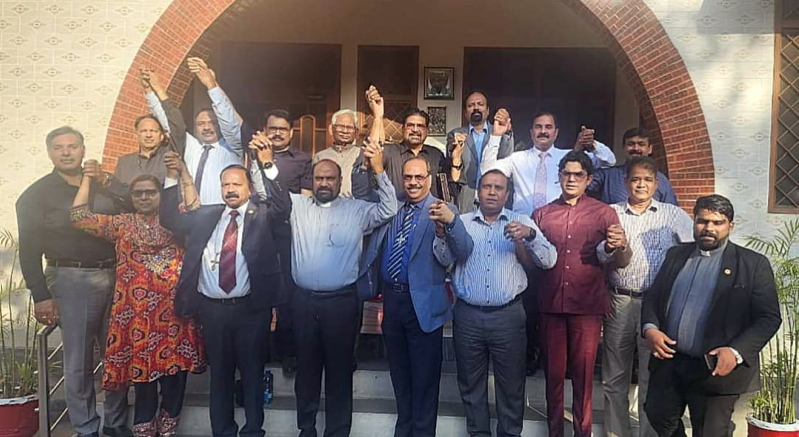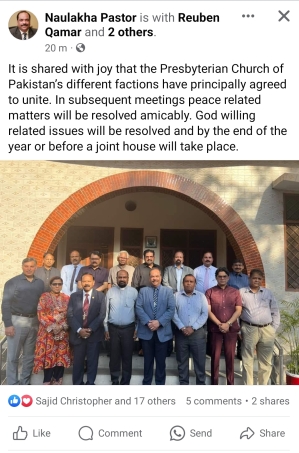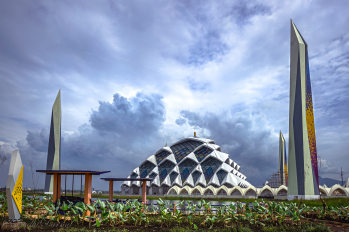
In a significant turn of events, the Presbyterian Church of Pakistan (PCP) has emerged from years of division and legal battles to reunite its fractured ranks, raising hope for a stronger, more cohesive denomination.
The PCP split into three major factions in 2018 after an internal strife primarily over the extension of the moderator’s tenure, sources in the PCP said.
“Then-moderator Reverend Dr Majeed Abel’s push for a five-year term instead of the constitutional three years was the leading cause of the bitter split in the PCP,” a Presbyterian pastor told Christian Daily International on the condition of anonymity.
He added that three factions emerged after the division and each group elected its office-bearers in the following years.
“The groups led by Rev Dr Abel, Rev Javel Gill and Rev Reuben Qamar engaged in legal battles, with each group claiming to be the rightful PCP. This confrontation left the church wounded and its witness compromised,” the source said.
A path to healing: bridging differences
After years of prayer, soul-searching and backchannel dialogues, the three factions finally announced on March 25 that they have chosen unity over discord.
“It is shared with joy that the Presbyterian Church of Pakistan’s different factions have principally agreed to unite. In subsequent meetings peace related matters will be resolved amicably. God willing related issues will be resolved and by the end of the year or before a joint house will take place,” Rev Abel wrote in a Facebook post after a meeting with leaders of the other groups.

Expressing hope for a renewed sense of purpose, Rev Abel told Christian Daily International that the PCP leaders realized that their differences could not be allowed to overshadow their shared commitment to Christ.
“Our calling is to proclaim Christ’s love and serve our communities. Divisions hinder that mission while our unity is a testimony to His grace,” he said, citing Psalm 133:1, “How good and pleasant it is when God’s people live together in unity!”
Dr Abel, who’s currently the executive secretary of his PCP group, said the three factions had resolved to withdraw court cases filed against each other and to form a joint committee to take the reconciliation process forward.
“We’ve decided to form a 9-member committee headed by the moderators of the three groups and comprising two representatives from each side. The committee will have its first formal meeting on April 19 during which we will chart our way forward.
“The committee will then reach out to presbyteries across Pakistan and make efforts to resolve their differences that have grown since the split in 2018. Once that has been achieved, all three factions will surrender their offices and call a General Assembly in November as per the PCP Constitution to elect the new office-bearers of the unified PCP,” he said.
Rev Reuben Qamar, the moderator of one of the three factions, said that the reunification of the PCP holds immense promise.
“The church’s fractured image can now be mended. Congregations across Pakistan will witness a united body, demonstrating Christ’s transformative power,” Rev Qamar told Christian Daily International.
Qamar confirmed that the PCP had split due to the demand for an extension in the moderator’s term.
“We were forced to form our group after several pastors who opposed the extension demand were either disgowned or terminated from the church, including the general secretary,” he said.
The pastor said that the Presbyterian church was known for its mission and social work in the subcontinent but the rifts in the church polity over the years had deeply hurt its reputation.
“I believe that this unification will have an overall positive impact on the church and its allied ministries, including educational and medical institutions that have suffered immensely due to the division,” said Rev Qamar.
He added that with resources no longer diverted to legal battles, the PCP can now focus on its core mission: spreading the gospel, serving the marginalized, and promoting justice.
“A unified church can better address societal issues, from poverty alleviation to education. The PCP’s collective voice will resonate louder,” he said.
Prominent theologian and former vice principal of the Gujranwala Theological Seminary, Rev Dr Maqsood Kamil welcomed the unification announcement by the three groups.
“Truly, in unity, they will find their strength,” said Dr Kamil, who has served the leading Presbyterian seminary for over two decades but was forced to step down due to the schism in the church.
He said that as PCP moves forward with this reconciliation, it would not only strengthen the Presbyterian church but also inspire other churches worldwide to forge unity.
According to the World Council of Churches, the Presbyterian Church of Pakistan was constituted in 1993. It has a long history rooted in the establishment of the Lahore Church Council of the United Church of Pakistan and the Synod of the United Presbyterian Church of Pakistan.
Presbyterian mission in the area was started in 1854 by the United Presbyterian Church of North America. The first presbytery was formed in 1859 and the synod of Punjab in 1893, which was declared autonomous in 1961 under the name United Presbyterian Church of Pakistan.





